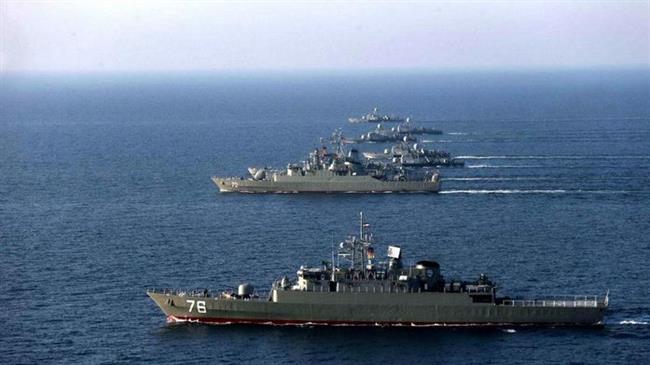Iran Navy to receive sophisticated drones as part of ongoing equipment upgrade: Cmdr.
Iran Navy's commander says the force will soon be flying sophisticated unmanned aerial vehicles from its warships, saying the new gear will be even more versatile than the Navy's current lineup of drones in terms of range and other technologies.
"Today, the Navy's warships are equipped with drones that have a range of 200 to 1,000 kilometers, but all the flight and intelligence limits will fade away once the new drones arrive," Rear Admiral Hossein Khanzadi told a gathering of Navy personnel and their families on Thursday.
Pointing to the force's great strides in expanding its aerial and naval capabilities, Khanzadi said the seamen were working round the clock to upgrade the equipment and that "we will soon witness the addition of long-range drones aboard our warships."
Sejjil: Iran Navy's first jet-powered drone
Khanzadi told Tasnim News in an interview that the Navy has successfully tested the second prototype of its first jet-powered drone named Sejjil, which is being designed and developed in coordination with the Defense Ministry.
The twin-engine UAV has a top flying speed of 1,000 kilometers per hour and can carry several bombs that can hit targets at a range of 100 kilometers, the commander said.
Rear Admiral Khanzadi noted that the whale-shaped Sejjil is designed to be launched from the sky deck of Iranian warships and parachutes to the water after completing its mission, where naval forces are ready to collect it.

He also said that the Navy would soon unveil the Simorgh drone, another domestic UAV that can remain in the air for 24 hours while carrying a range of weapons, electronic warfare systems and reconnaissance gear.
Khanzadi had earlier this year also revealed that the Navy was working on a vertically-launched drone.
More home-built warships coming
During his Thursday speech, Khanzadi also thanked his forces and military engineers for outfitting the domestically-made Jamaran warship with the latest and greatest in terms of missile launchers, radars, controls and other critical systems.
He said the Iranian Navy was putting the finishing touches on the latest generation of its warships that outdo the 1,300-tonne Jamaran in all aspects.
The admiral drew an analogy between the Navy's past and its current prowess, saying Iranian naval forces who once found it difficult to sail past the Persian Gulf and the Sea of Oman were now sailing on high seas around the world, from the Atlantic to the Pacific, and from the Pacific to other strategic waters across the world.
The commander said Iran has deployed its Alvand frigate to escort Iranian tankers and container ships in the Red Sea and the Suez Canal, which have been the scene of recurrent attacks by Somali pirates over the past years.
Khanzadi noted that regional countries held the key to peace and security in the Persian Gulf not foreign countries and their warships.
The remarks were a reference to America's attempts to form an anti-Iran patrol force that it claims will seek to protect shipping in the Strait of Hormuz.
Washington and its allies accuse Iran of attacking tankers and commercial ships on their way to cross the strategic choke point on two separate occasions earlier this year.
Iran has vehemently denied the allegations and warned neighbors against "false flags" by outsiders.
The Islamic Republic has also unveiled the Hormuz Peace Endeavor (HOPE), which seeks to bring calm to the Persian Gulf through constructive cooperation among its littoral nations.
Khanzadi's address marked the 39th anniversary of the Navy's Operation Morvarid, where Iranian missile boat Paykan -- backed by a huge combination of fighter jets and helicopters -- destroyed most of Iraq's US-backed naval forces and its oil rigs, shortly after Baghdad began invading Iranian territories in 1980.
US-Israel attack on a Tehran hospital targeted newborns, destroyed IVF center
US to 'bitterly regret' torpedoing Iranian warship in intl. waters: Iran FM
Some Arab rulers rejoicing at US-Israeli crimes against Iran: Yemen
IRGC strike targets US oil tanker in Persian Gulf
Iran does not rule out pulling out of 2026 World Cup as 'spiteful' US launches aggression
Iranian Armed Forces say no missile fired from Iran into Turkey
Iraqi Islamic Resistance warns European nations against entering into war with Iran
Schumer: 'Manic' Trump caused West Asia chaos, has 'zero' war plan












 This makes it easy to access the Press TV website
This makes it easy to access the Press TV website